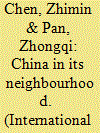|
|
|
Sort Order |
|
|
|
Items / Page
|
|
|
|
|
|
|
| Srl | Item |
| 1 |
ID:
109188


|
|
|
|
|
| Publication |
2011.
|
| Summary/Abstract |
China's regional policy is mainly centred on its efforts to forge a friendly, stable and prosperous neighbourhood. To achieve this end, China has developed an approach combining both partnership bilateralism and tailored regional multilateralism. By and large, China does not consider its neighbourhood as a whole and has been very cautious and hesitant to engage in overarching 'region-building'. China has relied mostly on soft (attractive) use of power, particularly economic power, supported by cultural and assurance diplomacy, even though diplomatic and economic coercion have been exercised occasionally. China has once again become the biggest economy in Asia. Yet, neither the new power configuration in Asia nor China's own ambitions point to a return to the old 'Middle Kingdom' with China holding a dominant position in its neighbourhood. China will most probably continue to see itself as a self-restrained regional power in the foreseeable future.
|
|
|
|
|
|
|
|
|
|
|
|
|
|
|
|
| 2 |
ID:
167806


|
|
|
|
|
| Summary/Abstract |
Faced with the emergence of strategic partnerships (SP), international actors have approached this new phenomenon in the international system through different logics of action. Such logics are tightly associated with the purposes that the SPs are intended to fulfill for the initiating actor. They also tend to reflect the worldview of the initiators as well as their perceptions of the major organizing principles of the international system. In this article, we investigate three different logics: the conventional, the relational, and the functional. These three logics correspond to the strategies of strategic partnering of the United States (US), China, and the European Union (EU) and reflect both the dominant foreign policy orientation of these actors and their self-perceptions as major poles of power in the world. We analyze the construction of these logics by focusing on the relative importance that each of them accords to interests and values when setting up SPs around the world. We contend that an important conceptual gap exists between the major initiators of strategic partnerships, the US and China, which are both to a large extent driven by a self-perception as Great Powers, although the logics with which they seek to fulfill this role diverge substantially. The EU pursues SPs according to a functional logic which in itself also diverge in significant aspects to both the US and China. Taken together, the interests which dictate the necessity of strategic partnerships and the values which condition their feasibility form four distinct patterns of partnering: the homogenous, marriage-of-convenience, come-in-handy, and heterogeneous SPs. These ideal forms of SPs have distinct but contrasting implications for the structure of the international system.
|
|
|
|
|
|
|
|
|
|
|
|
|
|
|
|
| 3 |
ID:
099341


|
|
|
|
|
| Publication |
2010.
|
| Summary/Abstract |
While, historically, sovereignty is what Europeans invented and what the Chinese were forced to accept, today it is what Europeans try to bury and what the Chinese hold dear. A conceptual gap on sovereignty clearly exists between China and Europe which more often than not exerts a negative impact on their relationship. It breeds misunderstandings and disputes, makes it more difficult to reach agreements on many bilateral issues, and complicates China-Europe cooperation in third countries. But the conceptual gap on sovereignty does not prevent China and Europe from building a strategic partnership. Given that strengthening or weakening national sovereignty means totally different things to China and Europe, the two parties should jointly and proactively manage their divergence on sovereignty issues by mutual avoidance, mutual assurance, and mutual accommodation, in order to unlock sovereignty-related impasses in China-Europe relations.
|
|
|
|
|
|
|
|
|
|
|
|
|
|
|
|
|
|
|
|
|